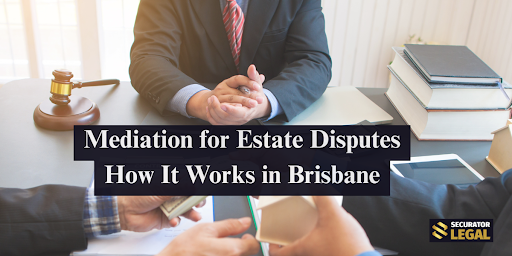In Brisbane, estate mediation brings families together with an impartial facilitator who helps everyone reach a fair agreement without going to court.
The last thing you want when a loved one passes away is a lengthy legal battle that drains both your finances and family relationships. That’s where estate mediation can help you settle disputes faster and preserve family bonds.
We, as a Brisbane-based law firm, Securator Legal, help families resolve these disputes with compassion and expertise.
In this article, we’ll walk you through:
- The benefits of mediation: saving time and money
- What happens at each step
- How do sentimental items get divided fairly
- Deadlines that could affect your claim
Stick with us to discover how mediation can resolve your estate dispute peacefully.
The Core Benefits of Estate Mediation in Brisbane
Estate mediation in Brisbane brings families together to settle disputes quickly, affordably, and without the stress of a courtroom battle. You get a chance to resolve differences in a private, respectful setting while protecting both your wallet and your family bonds.

Here are the main reasons why families across Brisbane choose mediation over court proceedings.
Time and Cost Efficiency
In comparison to going to court, choosing estate mediation saves you both time and money.
While court cases for family provision claims can drag on for 12 to 18 months, estate mediation wraps up in just weeks or a few months. Even the Supreme Court filing fee alone costs $819.90, and that’s before you consider the legal costs that can pile up during lengthy court battles.
Also, court proceedings drain your energy with multiple hearings, document exchanges, and strict deadlines that stretch the dispute. But the mediation process lets you resolve that time-consuming dispute fast and move forward with your life.
Maintaining Family Relationships
Beyond the significant financial savings, mediation offers a powerful advantage for the long-term well-being of the family.
The calm, neutral setting of mediation helps family members talk respectfully and resolve the estate dispute without the hostility that court proceedings often create. When both you and the other party sit down together with a trained mediator, the conversation stays focused on fixing problems instead of pointing fingers.
In our experience, estate mediation gives the family a better chance to keep their relationships intact. You get to control the outcome together rather than having a judge make decisions for you.
Guaranteed Confidentiality
Imagine your family’s private matters being discussed openly in a courtroom where anyone can listen. You don’t want your personal business becoming public record, right? That’s exactly what happens with court proceedings.
However, when you choose estate mediation, the discussions between you and the other party stay private. And if you end up in court later, nothing said during mediation can be used against either side. This means no awkward questions at the next family barbecue.
Once you understand these core benefits of mediation, the next step is learning exactly how the estate mediation process works in Brisbane.
The Estate Mediation Process in Brisbane: Step-by-Step
Thinking about how estate mediation works? We understand the confusion and stress that comes with not knowing what to expect. But don’t worry, we’re here to help.

In this section, we’re going to discuss how each stage of mediation helps families reach a fair settlement without the uncertainty of court proceedings.
Pre-Mediation Preparation and Disclosure
Before your mediation, you and the other party should openly share all financial documents, including a list of every single asset. This way, everyone enters the mediation with a complete picture of the estate.
Here’s what both you and the other party need to prepare:
- Gather financial records like bank statements and property valuations
- Collect any relevant wills, trust documents, or legal correspondence
- Seek legal advice to understand your rights and options
Once complete, this preparation helps everyone make informed decisions during estate mediation. The more transparent both sides are, the smoother the process becomes.
The Mediator’s Role: Facilitation Rather Than Decision
The mediator is a neutral person who doesn’t take sides or tell anyone what to do. Their job is to assist both parties as they discuss the issues openly and work toward an agreement that satisfies everyone.
Rather than making decisions for you, the mediator:
- Keeps conversations respectful so emotions don’t derail progress
- Helps clarify misunderstandings between parties
- Guides the parties through options to resolve the dispute
Helpful Tip: Choose a mediator with specific experience in estate disputes, as they’ll understand the emotional complexities and legal details that make these cases unique.
Formalising the Final Agreement
After the parties reach an agreement during mediation, you need to make it legally binding.
Here’s how to formalise your settlement:
- Step 1: With all specific terms clearly stated, document the agreement in writing
- Step 2: Have both parties review the settlement with their lawyers
- Step 3: Sign a formal Deed of Settlement that outlines each person’s obligations
- Step 4: If property orders are needed, file consent orders with the court
Before approving the consent orders, the court reviews them to ensure fairness. If you want your agreement to hold up legally, both parties should seek legal advice before signing to protect everyone’s interests.
Now that your mediation is complete and formalised, let’s explore how mediation handles the items that often mean the most to families.
Beyond the Money: Resolving Sentimental and Non-Financial Estate Disputes
Though financial assets get most of the attention in estate disputes, many families struggle with non-monetary items like a grandmother’s wedding ring or family photo albums. These personal belongings carry memories that no dollar amount can capture.
If you’re facing conflict over sentimental items, you can solve these disputes with estate mediation instead of expensive court battles.
Let’s look at how mediation handles the belongings that hold the most emotional weight for families.
Distributing Personal and Sentimental Assets
In many estate battles, a tea set or a favourite painting becomes the most heated point of disagreement between siblings. But mediation can assist family members in finding creative solutions that honour everyone’s emotional connection to these assets.
The process avoids the additional cost and stress of court battles over both money and sentimental belongings.
Here’s how mediation helps families resolve disputes about personal items:
Family Heirlooms and Mementos
The emotional value of a family heirloom often requires the compassionate, flexible approach that only mediation can provide. For example, when children both want their mother’s engagement ring, mediation provides solutions like rotating custody or resetting the ring into multiple pieces.
Funeral and Memorial Arrangements
Even the most personal decisions, such as a memorial service, become points of conflict that mediation can quickly resolve. This allows family members to finally get closure instead of suffering through a formal court order on these matters.
So far, we’ve covered the benefits of estate mediation, the step-by-step process, and how it handles sentimental items. Next, you’re going to learn about the strict deadlines that could affect your ability to make a claim.
The Crucial Role of Time Limits and Legal Advice
Why do so many estate claims fail before they even reach mediation or court? The answer is simple: families miss the strict deadlines that Queensland law sets for making a claim.
When you understand these time limits and get the right legal help early, you protect your ability to claim what’s rightfully yours.
Here’s what you need to know about deadlines and getting the right legal support.
Meeting Statutory Deadlines
Queensland law imposes strict time limits for parties to claim an estate, so you must act quickly. You have just 6 months to give written notice of your claim and 9 months to file court proceedings from the date of death.
Even if you choose mediation instead of court, these deadlines still apply to your estate dispute. That’s why starting the mediation early gives you time to settle before the deadline passes. If mediation fails, you’ll still have time to file with the court.
Helpful Tip: Write down the deadline date immediately and contact a lawyer at least 2 months before it expires to avoid last-minute panic.
When to Seek Expert Advice
You should seek legal advice immediately to understand the specific time limits that apply to your type of estate dispute.
The reason is that a lawyer can assist both you and the other party in understanding if mediation makes sense for your situation. They’ll explain the settlement process, help you prepare for negotiations, and ensure any agreement protects your interests.
We once helped a family who contacted us just 3 weeks before their deadline expired. After reviewing their situation, we fast-tracked their mediation process and helped them settle within 10 days. They avoided court entirely, but only because they acted quickly when they realised time was running out.
Turns out, the only thing faster than our mediation was how quickly their deadline nearly buried their inheritance.
Take Control of Your Family’s Future Today
Estate disputes drain relationships and bank accounts in many Brisbane families for months or even years. But you don’t have to let conflict destroy your family bonds or your inheritance due to lengthy court battles. When you choose mediation, it delivers a faster and more affordable path forward, and your decisions stay in your hands.
Throughout this article, we’ve shown you how mediation saves time and money compared to court proceedings. You’ve also learned the step-by-step process, how to handle sentimental items, and the strict deadlines you must meet.
If you want to discuss your estate dispute and explore mediation options, our team is available to guide you through the process.
Stay in touch to get more updates & alerts on Picnob! Thank you



